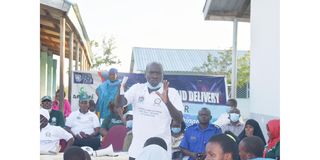Harmful traditions blamed for rising sexual offenses in Tana River

Garsen Court Senior Principal Magistrate Paul Rotich addressing parents and stakeholders in Tana Delta as the Court Users Committee marked the Children's week.
Harmful traditional and cultural practices are to blame for rising sexual offenses in Tana River County, Garsen Senior Principal Magistrate Paul Rotich has said.
He said parents misinterpret cultural and traditional norms to their children, thus inspiring immoral habits.
Of the 45 court cases heard during Children's Week, he said, more than 15 were influenced by retrogressive cultural practices like female genital mutilation and traditions like male circumcision.
"Parents have passed the wrong message to children, that once they have undergone the rites of passage, they are adults and mature to decide their lives," he said.
Most cases of defilement in the area, he said, involve minors and other minors in illicit relationships in primary and secondary schools.
Parents, he said, proceed to arrange engagement ceremonies and marriages of the minors, thus encouraging the vice.
"The high number of children dropping out of school to marry are supported by parents. The children have interpreted marriage more as a priority than education," he says.
He also noted that involving children in marriage ceremonies arouses the minors' curiosity to join an institution they barely understand.
Mr Rotich warned that unless parents end these practices, children will continue to be the losers and poverty will persist.
"We need to protect their dreams, and that should start by ditching the harmful cultural practices and encouraging morality in the traditional practices," he says.
Tana River County Gender Officer Millicent Ochieng noted that communities in the county still have not grasped the meaning of the law on children’s rights.
The elderly in the society who are mostly the decision-makers, she said, are sentimental in the conversation on harmful cultural practices and changing divisive traditional practices.
"We are engaging the youth in the conversation, but the stiffest are the elders, and the youth at the end of the day will listen to the elderly in the community, hence the need for all stakeholders to also focus their attention," she says.
Kenya Community Support System programme officer Stephen Otoi said children need more engagement on their rights in schools.
This, he said, will help them speak out openly about their experiences and protest where they feel shortchanged.
"It is time we incorporate legal aid training in schools. There is no doubt that most of them don't know what to do next after they find themselves in difficult situations like pregnancy, hence they opt to drop out of school," he says.
He said his organisation has prioritised children's affairs, ensuring they are linked to proper counselling and systems of justice when faced with difficult situations.
The organisation, he said, has partnered with activists to spearhead training against harmful cultural practices and traditional beliefs that make children vulnerable to sexual, physical, emotional and mental abuse.
The speakers made their remarks during the marking of Children's Week in Minjila, Tana Delta.
During the week that ended on Sunday, 45 children’s cases were heard. Some 15 of 38 criminal cases were heard and determined, while eight civil cases were settled.
Six children who were victims of sexual offenses were readmitted to various schools in the sub-county. Their academic progress will be closely monitored by the court users committee.





